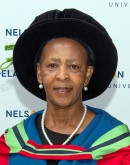 Prof Sindiwe James
Prof Sindiwe James
Faculty of Health Sciences
Lecture title: "Confinement and labouring women: a persistent struggle against nature"
Date: 21 October 2019
Nature in its essence is frequently viewed as a thing of beauty and the ultimate truth of perfection. Unfortunately, this view of nature is often undermined when it comes to the concept of women in confinement and labour. Women, naturally by virtue of being females, have the capacity to become pregnant and thus to bear children.
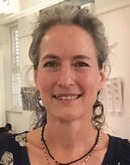 Prof Andrea Hurst
Prof Andrea Hurst
Faculty of Arts
Lecture title: Philosophy as laughter
Date: 26 August 2019
Contextualising my current philosophical preoccupations within the framework of my understanding of my task as a philosopher, I engage with the proposition that philosophers have a double task: firstly learning (and teaching) how to think, and relatedly, unexpectedly, learning/teaching how to laugh.
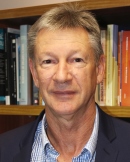 Prof Paul Poisat
Prof Paul Poisat
Faculty of Business and Economic Sciences
Lecture title: Demystifying Leadership Connectivity: Rediscovering the soul of leadership
Date: 12 August 2019
Leadership connectivity is examined from one of the key tenets included in definitions of leadership namely; the influence leaders have on employees/stakeholders. The lecture explores how a leader’s influence, through the exercise of specific connectivity related behaviours, can systematically create rapid, profound and sustainable changes in human behaviour (of followers/employees).
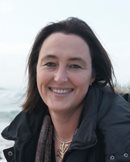 Prof Nadine Strydom
Prof Nadine Strydom
Faculty of Science
Lecture title: COASTAL FISHES UNDER THE MICROSCOPE: A MARINE BIOLOGIST'S JOURNEY
Date: 10 June 2019
What inspires someone to become a Marine Biologist? Introduction to subject matter that falls outside of the ordinary is imperative to showcase career opportunities. In my case, I was fortunate to grow up in a family with a generational history of fishing the wild coast of South Africa.
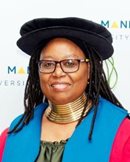 Prof Magnolia Ngcobo-Sithole
Prof Magnolia Ngcobo-Sithole
Faculty of Health Sciences
Lecture title: RESEARCH AND PROFESSIONAL WORK IN GENDER BASED VIOLENCE: LESSONS LEARNED AND PERCEIVED RISKS
Date: 3 June 2019
South Africa has made some strides in recognizing women’s rights in this country. However, women in the rural areas have not benefitted from most of the developments. They are still exposed to cultural practices that are dehumanising. I explore how these practices are linked to gender based violence.
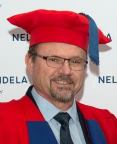 Prof Houdini Fourie
Prof Houdini Fourie
Faculty of Business & Economic Sciences
Lecture title: ETHICS, CULTURES, FRAUD AND CORRUPTION – THE UNANSWERED QUESTIONS
Date: 27 May 2019
The idea for the paper emanated from my concern regarding the absolute flood of unethical behaviour in recent times. Fraud and corruption in South Africa is rife and it seems that the average person has no control over what comes next. Considering the impacts of peoples’ background, social standing and culture, the paper considered the psychological processes through which learning of habits and mannerisms take place; and how it influences ethical behaviour.
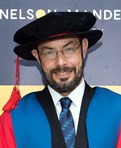 Prof Adrian Konik
Prof Adrian Konik
Faculty of Arts
Lecture title: DISCOURSE, CINEMA, AND DESUBJECTIFICATION: FROUM FOUCAULT TO DELEUZE AND BEYOND...
Date: 29 April 2019
Three lessons, so simple, but so life-changing: accept the madness of life, but don’t ever revere it, and when others do don’t forget to laugh – because there’s a great emancipatory power in that which derives from laughter’s resonance with the ‘unbearable lightness’ of being itself (Kundera 1980; Kundera 1984).
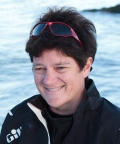 Prof Amanda Lombard
Prof Amanda Lombard
Faculty of Science
Lecture title: SO LONG, AND THANKS FOR ALL THE FISH (A HITCH-HIKER'S GUIDE TO SAVING THE SEA)
Date: 30 October 2018
Marine systems deliver ecosystem services upon which human well-being depends. These services include provisioning (e.g. food production), climate regulating (e.g. CO2 and heat absorption), supporting (e.g. oxygen production), and cultural (e.g. recreational benefits). Despite a clear understanding of this dependency, humans continue to impact marine systems in potentially irreversible ways.
 Prof Ronney Ncwadi
Prof Ronney Ncwadi
Faculty of Business & Economic Sciences
Lecture title: THE ENTREPRENEUR AS A DISEQUILIBRATING FACTOR IN ECONOMIC PROCESSES
Date: 23 October 2018
Recent evidence of entrepreneurship's significant contribution to economic growth and development, challenges the dominance of general equilibrium theory in microeconomics. The assumptions of the neoclassical economic model which underlies general equilibrium theory has long time been criticised; yet its consideration in policy formulation has not been dismissed despite the fact that general equilibrium theory does not incorporate entrepreneurship.

Prof Esmeralda Ricks
Faculty of Health Sciences
Lecture title: AN (AUTO)-BIOGRAPHICAL ACCOUNT OF NURSING TRANSFORMATION 1970-2017
Date: 10 September 2018
This lecture provides a description of how nursing education and practice, research and technology has transformed over the past 48 years. The information provided in this lecture is based on personal experience and own research, and research of various other authors.
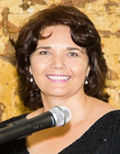
Prof Michelle Mey
Faculty of Business & Economic Sciences
Lecture title: ARSENIC IN THE BOARDROOM: STRATEGIES TO DEAL WITH TOXIC LEADERS
Date: 3 September 2018
In this lecture, Prof Mey deals with the sad reality is that there is a growing global prevalence of toxic leadership. Effective leaders are critical in building successful organisations, communities and nations. While toxic leaders, who initially come across as charming, confident and persuasive, may be effective in achieving organisational objectives in the short term, the long-term consequences can be devastating to the organisational brand and reputation, as well as to the morale and psyche of its members.

Prof Margie Cullen
Faculty of Business & Economic Sciences
Lecture title: HAPPINESS: A BUSINESS MODEL
Date: 27 August 2018
In this lecture, Prof Cullen deals with the concept of happiness - elusive and yet is known to everyone. It has been analysed by philosophers and poets and in antiquity centered on good luck and fortune. It is mentioned in religious writing. As such, happiness is not a new concept- it is a value - an important value. In some philosophies, it is the ultimate value where it is believed that the highest principle of morality is the maximisation of happiness for all. By definition, it is how well a person likes the life they lead. In the academic world, happiness has been the arena for philosophical speculation because of the lack of empirical measures. The social sciences have introduced survey research methods, which have dependable measures.
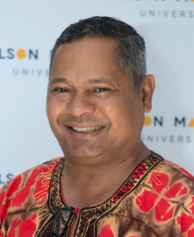 Prof André Keet
Prof André Keet
Chair for Critical Studies in Higher Education Transformation (CriSHET)
Lecture title: THE PLASTIC UNIVERSITY - KNOWLEDGE, DISCIPLINES AND DECOLONIAL 'CIRCULATIONS'
Date: 23 July 2018
In this lecture Prof Keet looks at how the ‘origin’ of the university, from which it has detached itself, is plastic: flexible, moldable, pliable, with an inscribed transformative ability rooted in the ‘nature’ of the knowledge and the disciplines with which it works. That is, the university’s essence is transformability. As our ways of disciplining the university have concealed this essence, the decolonial turn, his reading, is a call to excavate the innate plasticity of the university.
2017
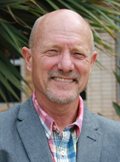 Prof Mike Roberts
Prof Mike Roberts
Faculty of Science
Lecture title: BIG THINKING. BIG SCIENCE. CAN AFRICA GROW INTELLECTUAL AND RESEARCH CAPACITY TO FIX ITS DEVELOPMENTAL CHALLENGES? OCEAN SCIENCE AND MARINE FOOD SECURITY AT NELSON MANDELA UNIVERSITY AS A TEST CASE
Date: 31 October 2017
In this lecture Prof Roberts talks about an increasing poor population, over-exploitation, habitat destruction, and a changing ocean whcih threaten ecosystem health and therefore food security and livelihoods. The oceans are warming, there is a decline in ocean productivity, poor coastal communities have low adaptive capacity as fishing is the only existence they know. The combination of these factors acting at a regional scale with relativity slow rates of change, and limited information, are leading to a humanitarian disaster of significant proportions — scarcely acknowledged by governments and international commissions.
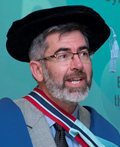 Prof Johan van Niekerk
Prof Johan van Niekerk
Faculty of Engineering, the Built Environment & Information Technology
Lecture title: ALICE IN CYBERLAND
Date: 5 September 2017
In this lecture Prof van Niekerk talks about the use of the Web has brought many benefits to humans, its adoption and diffusion has also had many undesirable and unanticipated consequences. This lecture will focus on these undesirable consequences. The lecture will firstly provide a broad overview of the current degree to which the use of cyberspace has been adopted worldwide, and more specifically in Africa and South Africa.

Prof Louise Stroud
Faculty of Health Sciences
Lecture title: THE INTERPLAY BETWEEN UNIVERSAL AND UNIQUE CONTEXTS IN SHAPING CHILD DEVELOPMENTAL ASSESSMENT
Date: 24 August 2017
In this lecture the revision of the Griffiths Scales of Child Development, or Griffiths III as it is now known, was described. Additionally a suggested plan for the future or “what next” phase in the interplay between universal and unique contexts in shaping child developmental assessment specifically using the Griffiths III was described and proposed.
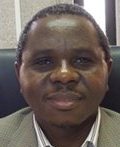
Prof Sebenzile Masango
Faculty of Arts
Lecture title: DEMOCRATIZATION OF STATE INSTITUTIONS AND PROCESSES: A CRTICIAL INGREDIENT FOR GOOD GOVERNANCE
Date: 27 July 2017
Prof Masango's inaugural lecture is presented from a South African perspective. The democratic values which are enshrined in the country’s constitution play a tremendous role on the manner in which public administration operates as well as social cohesion. State institutions are also bound by this reality.
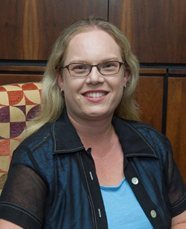 Prof Chantal Rootman
Prof Chantal Rootman
Faculty of Business & Economic Sciences
Lecture title: RESEARCH IN FINANCIAL SERVICES: PROFESSING A WAY FORWARD
Date: 11 July 2017
In her lecture, Prof Rootman addressed the importance of Financial Services Providers (FSPs) to the South African economy, specifically towards GDP growth, employment creation and employment transformation, dealing with some of the unanswered questions that clients have in this industry. Her extensive research within the field of marketing shows that the focus of research among FSPs relates to relationship marketing.

Prof Sylvan Blignaut
Faculty of Education
Lecture title: TWO DECADES OF CURRICULUM TRANSFORMATION: WHAT HAVE WE LEARNT AND WHERE DO WE GO FROM HERE?
Date: 29 May 2017
In his lecture, Prof Blignaut revisits the implementation of a new curriculum in South Africa’s schooling system and provides a brief overview of why curriculum change is so complex and fraught with difficulties.
2016
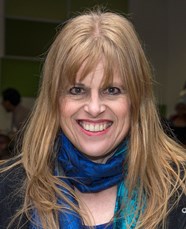 Prof André Mukheibir
Prof André Mukheibir
Faculty of Law
Lecture title: Transformative constitutionalism and reconciliation: Balancing the interests of victims and beneficiaries
Date: 8 September 2016
Twenty-two years into democracy, has our much-lauded constitution transformed what was a very unjust and unequal society into something better? Prof Mukheibir looks at South Africa's constituion to discuss what difference it has made.
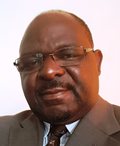 Prof Jonathan Makuwira
Prof Jonathan Makuwira
Faculty of Business & Economic Sciences
Lecture title: Water Under Troubled Bridge: The (Ir)Relevance of Development Studies Pedagogies in African Universities
Date: 18 August 2016
The relevance of universities as educational institutions in the modern era has, over the past decade, come under intense scrutiny for various reasons. In the development studies field, most of its content has been defined by the disjuncture between the emphasis on Western epistemology at the expense of local contexts; imported theoretical viewpoints at the expense of indigenous viewpoints.

Prof David Bell
Faculty of Science
Lecture title: Natural Systems and Human Affairs
Date: 2 August 2016
The presumption that Nature obeys deterministic laws and that an understanding of Nature is best arrived at by delving ever more deeply into the character and interactions of its fundamental constituents have dominated modern science. Nevertheless, many of science’s discoveries now point to a world underpinned by chance and uncertainty, with fundamental materials and behaviours incomprehensible in familiar physical terms. The study of complex systems narrows the gap between these profound but confusing implications of fundamental physics and world of everyday human experience.

Prof Shelley Farrington
Faculty of Business & Economic Sciences
Lecture title: Family Business: A Legitimate Scholarly Field
Date: 26 July 2016
The lecture provided some background to family businesses and highlighted their prominence and contributions worldwide. Given these contributions it is only fitting that academia recognise the importance of studying these businesses. Over a period of only 30 years, the field of family business has progressed significantly in terms of interested scholars, publication activity, numbers of journals and topics covered, as well as theories and methods used.
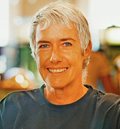 Prof Janet Cherry
Prof Janet Cherry
Faculty of Business & Economic Sciences
Lecture title: Social Structure and Human Agency in the Age of Climate Change
Date: 30 May 2016
The lecture deals with the relationship between social structure and human agency. This is not a new problem for social scientists, and the motive for Prof Cherry's intellectual enquiry over the past thirty-five years has not changed; it is how to respond to the injustices of our society, with a profound belief that a different social order is possible.